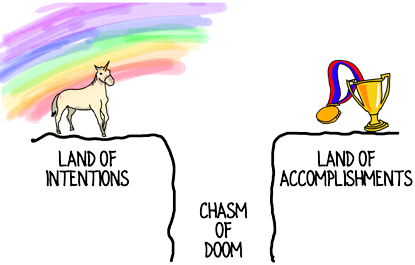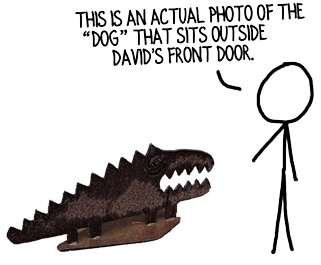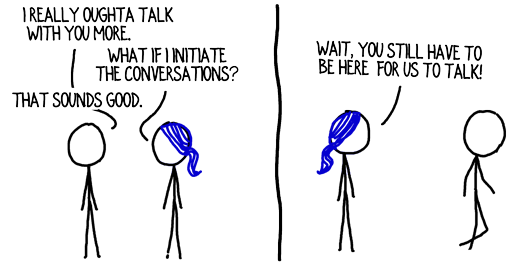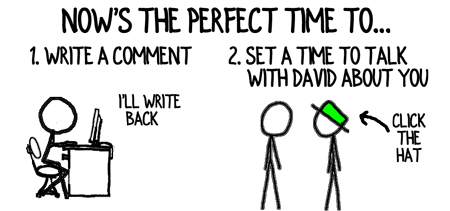I’m not a huge fan of “shoulds,” but they’re pretty common. In independent consulting they sound like, “I should reach out to more prospects regularly,” and “I should author more thought leadership,” and “I should contribute pithy comments at the end of David’s articles.” Stuff like that.
Some shoulds can be delegated to your assistant or a subcontractor, but what about tasks that require you, personally? It’s tough to delegate a one-on-one conversation, and no one else can update your CRM with information that only exists in your head. Or could they…?
Let’s talk for a moment about the Chasm of Doom.

Good intentions thrive over here, in the present. It’s a dreamy world where independent consultants call prospects every day, write Thank You cards, and ride unicorns over rainbows.
And here, in the middle, is the Chasm of Doom. This is where shoulds live. After intentions are set, but before they’re accomplished.
Accomplishments are here, in the possible future. Consultants who accomplish their intentions are comfortable and confident that their hard work creates happy clients and lucrative pipelines.
The bridge across the Chasm of Doom is built from planks of Willpower and Discipline. Heavy, fragile materials that are constantly in short supply. No wonder we wander deep in the chasm, oppressed by shoulds.
Escape from Doom: Walk the Dog Backwards
Most of us intend to engage in health-building activities, such as outdoor exercise. My neighbor, Steve, for instance walks outside twice a day, which is impressive. I only walk outside when my car reaches a building entrance; less impressive. (Except when the building is my hockey rink; more impressive.)
How has my neighbor crossed the Chasm of Doom from intention to accomplishment? What’s the difference between Steve and me? Our dogs.
My dog stays outside all the time and I don’t take him for walks. He doesn’t seem to mind, but it may be because he’s made of iron and inhabits a comfy spot near the front door.

Steve’s golden retriever, however, lounges inside their house and ventures outside twice a day with his owner to terrorize squirrels. (The dog sits while Steve chases rodents.)
I’ve noticed Steve never misses his twice-daily walks, even when the weather is cold and grim. His discipline and willpower are unshakable. Because, of course, his dog has to go outside twice a day.
The fact is, Steve isn’t terribly disciplined and he’s not really thrilled about always walking his dog. But the dog is demanding a walk. The dog is walking Steve. Or, as I like to say it, he’s walking the dog backwards.
Walking the dog backwards means delegating discipline.
In the consulting world, this means making someone else responsible for dragging you across the Chasm of Doom, sometimes kicking and screaming.
For instance, I always recommend consulting firms have an assistant maintain the CRM system. The job of the assistant is to interview the consultant(s) regularly and update the system.
Consultants aren’t disciplined enough to maintain the CRM on their own, but when the discipline is delegated, their new business development efforts are more consistent and successful.
Every other week, my assistant walks me through every client project and updates the clients’ project portals. Is that a task I could do myself? Yep. Should I update the portal every two weeks? Absolutely. Would I do it if I were left to my own devices? Nope.
On that task (and many others), I’ve walked the dog backwards. I’ve delegated discipline and, as a result, I deliver a better client experience.

Delegating discipline is a simple, yet surprisingly powerful approach to escaping the Chasm of Doom and enjoying the land of accomplishments.
Do you have other ideas for where you could walk the dog backwards in your practice? I’d like to hear them.
Text and images are © 2024 David A. Fields, all rights reserved.

 David A. Fields Consulting Group
David A. Fields Consulting Group 

Accountability… “try it again, for the very first time” (apologies for re-purposing a great advertising line for Corn Flakes).
No pun intended (Corn Flakes reference), I coach over 40 business owners in my area and one of the features of our methodology (The Alternative Board or TAB for short) that our members value the most is their fellow peer advisory group members hold them accountable to keep the promises they make to themselves. I also like your approach David, but it seems two keys to making this work is to find the right assistant (in DISC speak – seems you may need to find a high D, high C person) to ask these questions and to also be careful not to “shoot the messenger” for their discipline to ask these questions faithfully.
Your opening line was funny, David. Most of us need to try many things again for the first time–be they breakfast cereals, interpersonal best practices or business disciplines. As Samuel Johnson aptly said, “People need to be reminded more often than they need to be instructed.”
You’re also quite right that the person (or dog) you’re delegating to has to be willing to take responsibility for being consistent and you need to thank the person dragging you across the Chasm of Doom.
So true, thank you David. One of my favorite quotes is “Every system is perfectly designed to get the results it gets.” And engaging a Virtual Assistant creates a system that produces the results we want. The other point your article makes indirectly is that as consultants we should focus on consulting, the big items, and not clutter our mind and divert our attention with the necessary but more mundane stuff.
I’m getting ready to engage my personal VA to start delegating theses kind of tasks and am excited about the prospect of it freeing up more time and getting the results I want.
Congratulations on your impending hire, Christian. As independent consultants–solo practitioners and leaders of small firms– we are entrepreneurs. That means our responsibilities are broader than pure consulting and we must constantly strive to focus our energies on what we do best while assembling a team to support us. Thanks for contributing your experience to the conversation.
This is great for teams and accountability, too. Building in checkpoints to report on the things for which they are responsible makes them more likely to get them done. Even if they scramble to accomplish them right before it’s time to report on accountability…
Tom, you are so right on the effect of accountability. Even very experienced consultants at boutique firms scramble to get everything on their commitment list done the day before our regular calls. We are all bombarded with so many priorities and possibilities, that having an outside force impose clear deadlines can be very effective. Plus, ass you’ve pointed out, when teams delegate discipline they often function better as individuals and as a group. That’s a great addition to the article, Tom.
Thank you, David, for removing the guilt and sorting out the issues. With 340 days left, this just might be a banner year! All the best to you!…Tris Coffin CMC
Guilt is like any other emotion–it’s useful if it prompts you to act. In some ways, walking the dog backwards is an approach that ensures you’re subjected to a regular dose of guilt if you don’t act, and that’s why it works. Regardless, I’m totally confident this will be a banner year for you, Tris!
My way of converting shoulds” into “dones” is to think about the situation once, decide on the best course of action and convert this decision into a time-linked routine or a scheduled task. Thus, when time to act arrives I have no time to reconsider. As nothing happens unless it happens during some time, if no time is given – no reconsideration happens.
One of my routines is “start work day with reading David’s blog”. This is my way of correcting a mistake of not have been reading it for almost a year.
Anatoli, you’ve cleverly delegated discipline to your calendar. That’s an outstanding approach for people (like you) who are disciplined about living up to the commitments on their calendar and who are firm with their mindset. As you’ve said, “I have no time to reconsider,” which means you’ve steeled your mind to ignore distractions and excuses. Impressive.
Of course, I love the beginning to your daily routine. You should consider joining my Consulting Moments Continuity Club: each time you read a blog, you add a chocolate to a tin. When the tin has 12 chocolates, you send it in the mail to me as proof that you’re serious about improving your consulting practice. Yes, some people may consider that oddly beneficial to the blog’s author rather than the reader, but really, I’m eating all that chocolate for you.
Prior to starting my work day I eat a piece of chocolate myself. This serious matter does not allow delegation